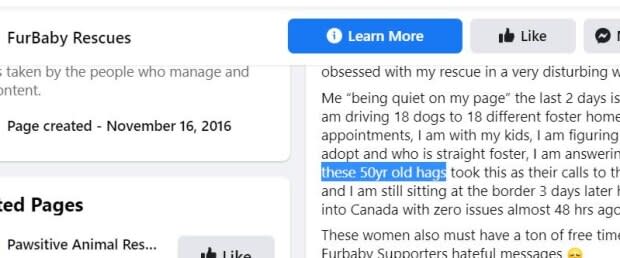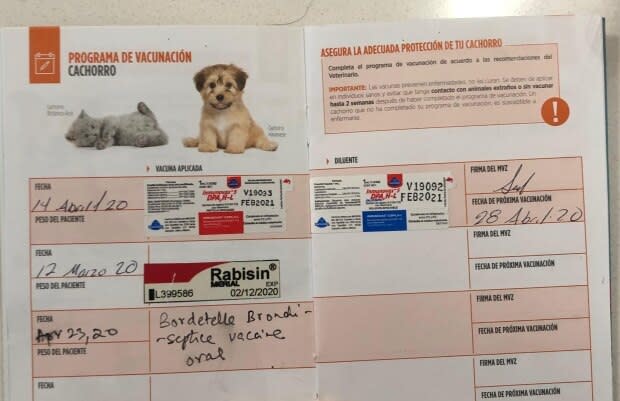Sale of sick dogs from Mexico leads to demands for better regulation of dog rescue groups in B.C.
A Chilliwack-based dog rescue organization has come under fire from former customers who say they thought they were adopting fully-vetted dogs from "kill shelters" in California— only to end up with sick dogs from Mexico.
Furbaby Rescues owner Krystle Jores charges as much as $1,100 for a vaccinated and fixed puppy — twice the average top price charged by other B.C. dog rescue organizations surveyed by CBC News.
Ashley Kipping of Squamish says she spent $3,900 to keep her dog Kihei alive, after it started hemorrhaging from a tick-borne illness endemic to Mexico.
"It just makes me want to cry still," said Kipping. "I wasn't expecting that dog to be this sick or for vet bills to so quickly add up."

Lorrie Carlson of Victoria shelled out $1,600 in vet fees when her newly-adopted dog Lily came down with a mystery illness.
"It was scary for me," said Carlson, 50. "I thought I was gonna lose her."
They were among eight former customers who spoke with CBC News about their experience with ailing dogs adopted from Jores.
Their complaints have raised concerns over the introduction of foreign diseases dangerous to B.C. pets and renewed calls for better oversight of dog rescues.
The lack of federal and provincial regulations means no rules have been broken.
'Furbaby Rescues do not respond to rumours and drama'
Jores declined CBC's request for an interview, but in a text stated: "Furbaby Rescues and those associated do not respond to rumours and drama" and cited "800 happy adopters."
On her FurBaby Rescues Facebook page, Jores has been more blunt, calling out "50-year-old hags" and "haters" who have complained about her practices.
She labelled them "middle-aged women who are obsessed with my rescue in a very disturbing way."
Kipping, who is 37, says she became the target of a personal attack.

Personal details published
When Kipping withheld her $1,100 payment after Kihei became ill, she says Jores posted a photo of her passport, supplied as ID when the dog was delivered.
The photo included Kipping's home address and phone number.
A man then texted Kipping, stating "you're a real shitty person ... also your address is out there and you're getting people showing up at your door soon."

Kipping quickly negotiated a lower $800 price for Kihei— and Jores took down the passport photo, posting: "Was [that] professional? Probably not. Did it get her ... to pay the fee? Absolutely it did. And that was the entire point."
Dog 'was actually from the streets of Tijuana'
The Furbaby Rescues page states: "In Southern California alone, 6,000 healthy dogs are euthanized per month at animal kill shelters. We bring them up to B.C. and adopt them out to loving homes."
There is no mention of rescue dogs coming from Mexico.
But both Kipping and Carlson say vaccinations records accompanying their dogs were in Spanish and signed by a Mexican vet.
"In reality [Kihei] was actually from the streets of Tijuana," said Kipping.

Costs per dog
A check with the Central California SPCA (CCSPCA) in Fresno confirms Jores occasionally buys dogs from their kill shelter.
But while the FurBaby Rescue page claims a total cost of $670 Cdn for a fully-vaccinated and fixed dog brought in from the U.S., the CCSPCA says it charges her $177 Cdn.
Adding $100 per dog for transportation [as Jores lists], the total per CCSPCA dog is $277 Cdn— far below her $700 to $1,100 fee.

Calls to a California dog broker Jores also buys from, believed to be the source of the Mexican dogs, were not returned.
Furbaby Rescues is registered as a non-profit society in B.C. and a charity in Canada.
Shipment stopped at border
Currently, there is also no quarantine required for dogs being brought across the B.C. border— just proof of an up-to-date rabies vaccination.
On April 26, Jores failed to have that proof when she tried to bring 18 dogs in a private vehicle across the Sumas-Huntington border crossing.
In a Facebook post Jores stated: "It was a simple mistake and we realized it right away."
She claims proof of vaccination was produced the next day and the dogs were allowed into Canada.

Standards of practice needed
A B.C. charity that advocates for animal welfare says concerns over FurBaby Rescues highlights the need for tougher government regulation of dog rescues.
"It is the Wild West," said Kathy Powelson, president of the Paws for Hope animal foundation (PAHS). "There is no standards that organizations must meet in order to do this work."
Powelson says she's working on a voluntary accreditation program so the public will know which dog rescues meet "standards of practice."
'Safety concern for the whole population'
Kipping's vet, Dr. Jefferson Manens, says there's a bigger worry about sick dogs being brought in from Mexico — diseases that could threaten dogs here in B.C.

While Kihei's tick-borne illness wasn't contagious, Dr. Manens says that's not always the case.
"There's really questions about some of these weird infectious diseases," said the internal medicine specialist," which would be a health safety concern for the whole population."
Dr. Manens says there's a simple solution if you want to adopt a rescue dog.
"There's a large population of dogs that need to be adopted in B.C. and in Canada."
CBC Vancouver's Impact Team investigates and reports on stories that impact people in their local community and strives to hold individuals, institutions and organizations to account. If you have a story for us, email impact@cbc.ca.


